A hate crime is a criminal act where the offender targets someone based on bias against the victim’s actual or perceived minority group status. The FBI reported 6,121 documented hate crime incidents in 2016, an increase of 10 percent since 2014. Political scientist Richard Fording and criminologist Matthew Nobles will analyze the community-level factors that contribute to hate crime commission, using 2,500 reports of hate crimes from the National Criminal Victimization Survey (NCVS) for the 2006-2017 period.
Co-funded with the Carnegie Corporation
Over three million refugees have settled in the U.S. since the 1970s. Yet, refugees face many barriers to successful integration and are at risk for social isolation, poverty, and unemployment.
About This Book
From "The Forum" for March, 1910, detailing efforts at reforming and regulating dangerous fireworks celebrations for Independence Day.
Julia Hyneman Barnett Rice was a member of the Department of Child Hygiene of the Russell Sage Foundation.
Download
RSF Journal
View Book Series
Sign Up For Our Mailing List
Apply For Funding
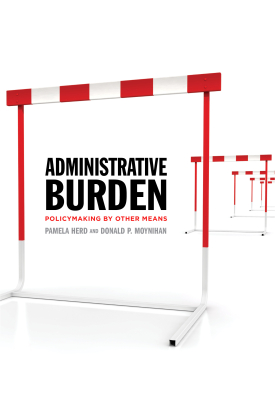
Administrative Burden
About This Book
Winner of the 2022 Herbert Simon Best Book Award Presented by the Public Administration Section of the American Political Science Association
Winner of the 2020 Outstanding Book Award Presented by the Public and Nonprofit Section of the National Academy of Management
Winner of the 2019 Louis Brownlow Book Award from the National Academy of Public Administration
“By putting a spotlight on the consequences of administrative burdens, Herd and Moynihan have done a great public service.” New York Review of Books
“Our confidence in government as a force for the public good is at stake. Read this book and see why.” Journal of Policy Analysis and Management
“Herd and Moynihan perform an excellent service for Americans who are being short-changed in terms of taxes they have paid, rights they are constitutionally guaranteed and opportunities that sadly may never materialize.” The Innovation Journal
“(A) brilliantly written and thought-provoking book that should be situated in the context of the general debate over the scope of social policy in democratic societies.” Journal of Public Administration Research and Theory
“(A) landmark study explaining how administrative burdens impact outcomes associated with U.S. policymaking. This volume will influence a wide swath of students in the related fields of public administration and public policy.” P.S. Perspectives on Politics
“Exactly what a conceptual frame-work should be: usable…will surely become required reading for public management scholars and students alike due to its clear framework and policy breadth.” Governance
“(F)ascinating…a systematic account of “policy by other means” that must be heeded by policy makers and social scientists alike. They provide a reckoning of an often ignored, but critical, dimension of policy implementation as a political venue.” Journal of Politics
“Herd and Moynihan’s collective voice provides inspiration by emphasizing that an evolved approach to good government through burden reduction could have significant positive impact on individual lives…essential reading for public policy students and practitioners.” Political Science Quarterly
“(A)n exceptional text that comes at an exceptional time in our nation’s history. If used properly, it may be an exceptional instrument for the preparation of scholars and practitioners desiring to produce a just and efficient government.” Journal of Public Affairs Education
“A path-breaking framework for deeper study of policy making, implementation, and evaluation that has the potential to add contextual depth and analytical rigor to our conceptions of government action.” Public Administration Review
“Citizens routinely experience government in their everyday lives, and too often such encounters impose cumbersome challenges and reinforce inequality. In this clearly written and power fully argued book, Pamela Herd and Donald P. Moynihan argue that these ‘administrative burdens’ are political tactics, strategically applied to policies by political leaders who aim to restrict access to rights and benefits. Change is possible, however, as demonstrated by policies in which more effective and efficient procedures have been adopted. This captivating and important book is a ‘must read’ for anyone who wants to see government operate better in serving citizens.”
—SUZANNE METTLER, John L. Senior Professor of American Institutions, Cornell University
“In ways variable and systemic, citizens shoulder burdens of the everyday operations of government. This fundamental truth of modern public administration has never received the attention it merits. Until now. With cutting-edge conceptual formation, mixed methodological lenses, and uncommon rigor, Pamela Herd and Donald P. Moynihan have authored an instant classic on a problem of vast proportions, one that will be setting research agendas for decades to come.”
—DANIEL CARPENTER, Allie S. Freed Professor of Government, Harvard University
Bureaucracy, confusing paperwork, and complex regulations—or what public policy scholars Pamela Herd and Donald Moynihan call administrative burdens—often introduce delay and frustration into our experiences with government agencies. Administrative burdens diminish the effectiveness of public programs and can even block individuals from fundamental rights like voting. In Administrative Burden, Herd and Moynihan document that the administrative burdens citizens regularly encounter in their interactions with the state are not simply unintended byproducts of governance, but the result of deliberate policy choices. Because burdens affect people’s perceptions of government and often perpetuate long-standing inequalities, understanding why administrative burdens exist and how they can be reduced is essential for maintaining a healthy public sector.
Through in-depth case studies of federal programs and controversial legislation, the authors show that administrative burdens are the nuts-and-bolts of policy design. Regarding controversial issues such as voter enfranchisement or abortion rights, lawmakers often use administrative burdens to limit access to rights or services they oppose. For instance, legislators have implemented administrative burdens such as complicated registration requirements and strict voter-identification laws to suppress turnout of African American voters. Similarly, the right to an abortion is legally protected, but many states require women seeking abortions to comply with burdens such as mandatory waiting periods, ultrasounds, and scripted counseling. As Herd and Moynihan demonstrate, administrative burdens often disproportionately affect the disadvantaged who lack the resources to deal with the financial and psychological costs of navigating these obstacles.
However, policymakers have sometimes reduced administrative burdens or shifted them away from citizens and onto the government. One example is Social Security, which early administrators of the program implemented in the 1930s with the goal of minimizing burdens for beneficiaries. As a result, the take-up rate is about 100 percent because the Social Security Administration keeps track of peoples’ earnings for them, automatically calculates benefits and eligibility, and simply requires an easy online enrollment or visiting one of 1,200 field offices. Making more programs and public services operate this efficiently, the authors argue, requires adoption of a nonpartisan, evidence-based metric for determining when and how to institute administrative burdens, with a bias toward reducing them. By ensuring that the public’s interaction with government is no more onerous than it need be, policymakers and administrators can reduce inequality, boost civic engagement, and build an efficient state that works for all citizens.
PAMELA HERD is a professor in the McCourt School of Public Policy at Georgetown University.
DONALD MOYNIHAN is the inaugural McCourt Chair in the McCourt School of Public Policy at Georgetown University.
Download
Related Events & Media
RSF Journal
View Book Series
Sign Up For Our Mailing List
Apply For Funding
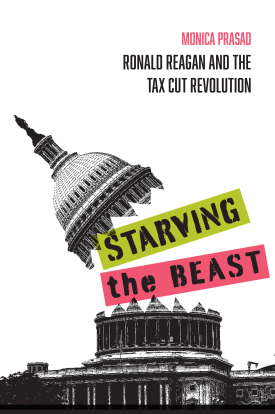
Starving the Beast
About This Book
Winner of the 2019 Viviana Zelizer Best Book Award from the Section of Economic Sociology of the American Sociological Association
“Monica Prasad begins with an unabashedly favorable view of European welfare states yet gives validity to conservative concerns over taxing production rather than consumption. Readers from all political suasions shouldn’t be deterred by whether they agree with theses like these. By reading Starving the Beast, they will garner much better understanding of the history, events, and forces surrounding the conversion of the Republican party to being the Santa Claus of tax cutting.”
—Eugene Steuerle, Institute Fellow and Richard B. Fisher Chair, The Urban Institute
“Republican commitment to tax cuts is one of most consequential and problematic features of modern American politics. Monica Prasad's fascinating book, Starving the Beast, offers a compelling new explanation of how this came to be.”
—Lane Kenworthy, professor of sociology and Yankelovich Chair in Social Thought University of California, San Diego
Since the Reagan Revolution of the early 1980s, Republicans have consistently championed tax cuts for individuals and businesses, regardless of whether the economy is booming or in recession or whether the federal budget is in surplus or deficit. In Starving the Beast, sociologist Monica Prasad uncovers the origins of the GOP’s relentless focus on tax cuts and shows how this is a uniquely American phenomenon.
Drawing on never-before seen archival documents, Prasad traces the history of the 1981 tax cut—the famous “supply side” tax cut, which became the cornerstone for the next several decades of Republican domestic economic policy. She demonstrates that the main impetus behind this tax cut was not business group pressure, racial animus, or a belief that tax cuts would pay for themselves.
Rather, the tax cut emerged because in America--unlike in the rest of the advanced industrial world—progressive policies are not embedded within a larger political economy that is favorable to business. Since the end of World War II, many European nations have combined strong social protections with policies to stimulate economic growth such as lower taxes on capital and less regulation on businesses than in the United State. Meanwhile, the United States emerged from World War II with high taxes on capital and some of the strongest regulations on business in the advanced industrial world. This adversarial political economy could not survive the economic crisis of the 1970s.
Starving the Beast suggests that taking inspiration from the European model of progressive policies embedded in market-promoting political economy could serve to build an American economy that works better for all.
MONICA PRASAD is professor of sociology and faculty fellow in the Institute for Policy Research at Northwestern University.
Download
RSF Journal
View Book Series
Sign Up For Our Mailing List
Apply For Funding
Social scientists have examined the role of policy decisions by U.S. political institutions that contribute to increased inequality and found that policymakers are more responsive to the preferences of economic elites than other citizens. Further, they find that political inequality is associated with economic inequality. Most of these findings are based on studies of federal legislation.
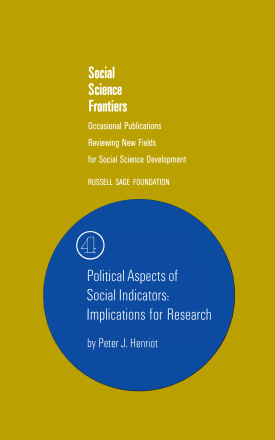
Political Aspects of Social Indicators
About This Book
Complementing the focus on the structural and social-psychological aspects of measuring social change, this report establishes a research approach relating social measurement to antecedent and consequent political considerations: political values, policy impact, power consequences, administrative influences, institutionalization, and so forth. This study is directed to any social scientist interested in political phenomena and in the issue of the relationship between social science and public policy.
Peter J. Henriot, Center of Concern, Washington, D.C.
Download
RSF Journal
View Book Series
Sign Up For Our Mailing List
Apply For Funding
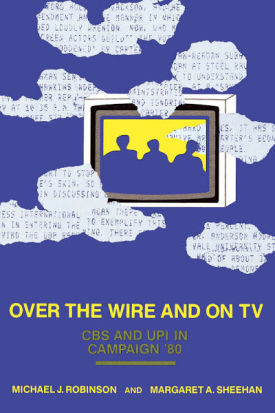
Over the Wire and on TV
About This Book
First the press became the media, and now the media have become the Imperial Media—or have they? In this timely and comprehensive analysis, Michael Robinson and Margaret Sheehan examine how the news media behaved (or misbehaved) in covering the 1980 presidential campaign.
Using the media's own traditional standards as a guide, Robinson and Sheehan measure the level of objectivity, fairness, seriousness, and criticism displayed by CBS News and United Press International between January and December of 1980. Drawing on statistical analyses of almost 6,000 news stories and dozens of interviews with writers and reporters, the authors reach convincing and sometimes surprising conclusions. They demonstrate, for example, that both CBS and UPI strictly avoided subjective assessments of the candidates and their positions on the issues. Both gave the major parties remarkably equal access. But the media seem to give more negative coverage to front-runners, treating serious challengers less harshly. Perhaps the most surprising finding is that networks were not more superficial than print; CBS attended to the issues at least as often as UPI.
Robinson and Sheehan find television coverage more subjective, more volatile, and substantially more negative than traditional print. But CBS behaved neither imperially nor irresponsibly in Campaign '80. The networks did, however, emulate the more highly charged journalism of the eastern elite print press.
By blending the quantitative techniques of social science and the tools of Washington-based journalism, Robinson and Sheehan have produced a book that will be essential reading for students and practitioners of politics, public opinion research, journalism, and communications. Lively and readable, it should also appeal to anyone interested in the role of the news media in contemporary politics.
MICHAEL J. ROBINSON is associate professor of politics at Catholic University and director of the Media Analysis Project at George Washington University.
MARGARET A. SHEEHAN is research analyst for a law firm in Washington, D.C.
Download
RSF Journal
View Book Series
Sign Up For Our Mailing List
Apply For Funding
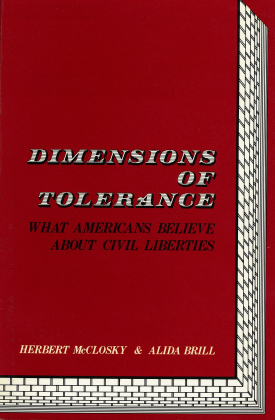
Dimensions of Tolerance
About This Book
Although tolerance is one of our most cherished ideals, history suggests it is not an inborn human trait. Tolerance must be learned, and the sophisticated arguments on which it is based make it much harder to learn than intolerance. In this extensive study of civil liberties, Herbert McClosky and Alida Brill attempt to discover who learns the norms of tolerance and why.
Reaching well beyond traditional categories of analysis, McClosky and Brill have surveyed civil libertarian attitudes among the general public, opinion leaders, lawyers and judges, police officials, and academics. They analyze levels of tolerance in a wide range of civil liberties domains—first amendment rights, due process, privacy, and such emerging areas as women's and homosexual rights—and along numerous variables including political participation, ideology, age, and education.
This landmark study offers a comprehensive assessment of the viability—and vulnerability—of beliefs central to the democratic system. It makes an invaluable contribution to the study of contemporary American institutions and attitudes.
Herbert McClosky was research director at the Survey Research Center in Berkeley and professor of political science at the University of California, Berkeley.
Alida Brill was program director and scholar in residence at the Russell Sage Foundation.
Download
RSF Journal
View Book Series
Sign Up For Our Mailing List
Apply For Funding
Co-funded with the Robert Wood Johnson Foundation
The Affordable Care Act (ACA) has shaped American politics since its introduction in Congress. In December 2017, Congress passed a tax bill which included a repeal of the individual mandate to purchase insurance. That change, coupled with administrative decisions by the current administration, means that the future of health policy remains uncertain.
Pagination
- Previous page
- Page 17
- Next page
